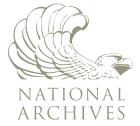National Archives (United States)
| NARA | |

Seal
|
|

National Archives logo
|
|
| Agency overview | |
|---|---|
| Formed |
June 19, 1934 (Independent Agency April 1, 1985) |
| Preceding agency |
|
| Jurisdiction | Federal government of the United States |
| Headquarters | 700 Pennsylvania Avenue NW, Washington, D.C. |
| Employees | 3,112 (2014) |
| Annual budget | $391 million (FY 2012) |
| Agency executives |
|
| Website | archives.gov |
June 19, 1934
The National Archives and Records Administration (NARA) is an independent agency of the United States government charged with preserving and documenting government and historical records and with increasing public access to those documents, which comprise the National Archives. NARA is officially responsible for maintaining and publishing the legally authentic and authoritative copies of acts of Congress, presidential proclamations and executive orders, and federal regulations. The NARA also transmits votes of the Electoral College to Congress.
The chief administrator of NARA is the Archivist of the United States.
The Archivist of the United States is the chief official overseeing the operation of the National Archives and Records Administration. The Archivist not only maintains the official documentation of the passage of amendments to the U.S. Constitution by state legislatures, but has the authority to declare when the constitutional threshold for passage has been reached, and therefore when an act has become an amendment.
The Office of the Federal Register publishes the Federal Register, Code of Federal Regulations, and United States Statutes at Large, among others. It also administers the Electoral College.
The National Historical Publications and Records Commission (NHPRC)—the agency's grant-making arm—awards funds to state and local governments, public and private archives, colleges and universities, and other nonprofit organizations to preserve and publish historical records. Since 1964, the NHPRC has awarded some 4,500 grants.
...
Wikipedia
